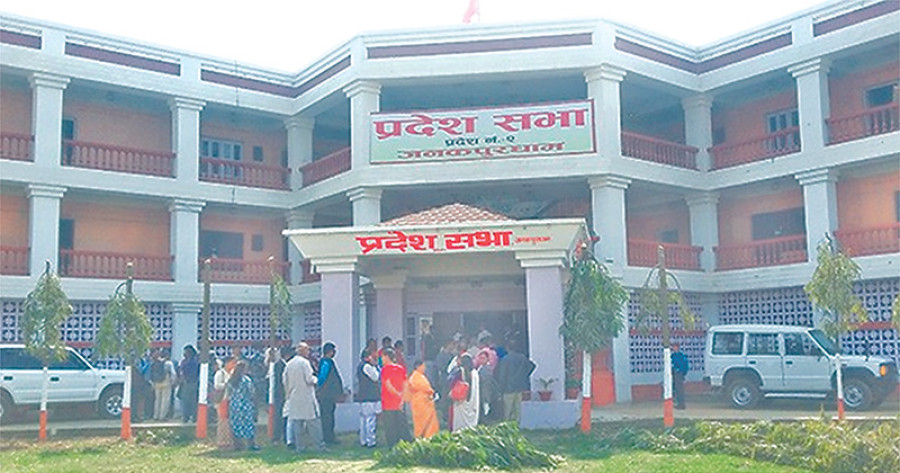National
Province 2 to have its own officials ‘to check’ chief district officers’ authority
Vexed at the federal government’s plan to not only continue with the chief district officers but also to “empower” them, Province 2 has prepared its own bill with the provision of having its own “district administrators”—a position parallel to CDOs—in a move that could further escalate Centre-province conflict.
Tika R Pradhan
Vexed at the federal government’s plan to not only continue with the chief district officers but also to “empower” them, Province 2 has prepared its own bill with the provision of having its own “district administrators”—a position parallel to CDOs—in a move that could further escalate Centre-province conflict.
The federal government, on the national security and other pretexts, has registered a bill on peace and security at the federal parliament, as per which chief district officers will have a key role when it comes to security and law and order matters in the provinces.
Provincial governments have objected to the move, saying it undermines their role.
Gyanendra Yadav, minister for law and internal affairs of Province 2, said his government has already prepared a bill on provincial administration. “The bill was endorsed by the Cabinet and will be tabled at the Provincial Assembly soon,” Yadav told the Post over phone. “We can accept chief district officers only if they agree to remain under the provincial government—or else we will authorise our district administrators for the job the chief district officers do,” Yadav said.
This is not the first time Province 2 has come face to face with the Centre.
Earlier, following a long delay by the federal government in introducing the umbrella law on police management, Province 2 had come up with its own Police Bill in October. That had created quite a furore, with some including former prime minister Pushpa Kamal Dahal, co-chair of the ruling Nepal Communist Party (NCP), even warning that “any move to overtake the Centre would jeopardise republicanism”.
The conflict over the police bill had come to an end after Province 2 agreed to put its legislation on hold until Kathmandu came up with the Federal Police Law.
But the federal government’s draft of the Peace and Security and Law and Order Bill again riled the provinces, which have been saying that the Centre should let provincial governments exercise their authority.
As per the bill, security agencies in the districts should take instructions from the chief district officers, who would report to and receive instructions from the federal Home Ministry and the respective provincial internal affairs ministry.
Provincial governments and experts on federalism say the provision puts chief district officers as the federal Home Ministry’s liaison, which will make them more inclined to the Centre than the provincial governments.
While Province 2 has moved a step forward by introducing its own provision of having “district administrators”, other provinces said they were on a “wait and see” mode.
“We will wait and see how the federal Parliament comes up with bills related to security, police and law and order,” Shalikram Jammarkattel, minister for law and internal affairs of Province 3, told the Post. “Then we will make our move accordingly,” added Jammarkattel, one of the most vocal critics of what he calls the Centre’s domination over the provinces.
According to Yadav, the Province 2 minister, the new bill envisions installing “district administration officers” in the eight districts of the province to function as chief district officers. The provincial government endorsed the bill on Friday.
According to Yadav, the bill entrusts the“district administration officers” with the responsibility of taking care of all the security arrangements in their respective districts. “They will also have the authority to register organisations,” he said.
According to Yadav, once the bill is endorsed by the provincial assembly, anyone wishing to hold seminars and gatherings needs to receive permission from the “district administration officers”. “They can even give orders—of course in consultation with the internal affairs and law minister—to shoot, and impose curfews wherever necessary, besides monitoring markets,” said Yadav.
These provisions look similar to those proposed in the federal security bill. Section 17 of the bill gives chief district officers the authority to impose curfew and Section 18 authorises them to declare riot-affected zones. Chief district officers will also manage security during festivals and gatherings.
“We were forced to prepare the bill as the peace and security situation in the province was deteriorating and the Centre did not heed our repeated requests for resolving security issues,” Yadav added.
But Home Ministry officials in Kathmandu claimed that provincial governments cannot enact laws challenging the federal government’s provisions.
“Province 2 might have prepared the bill to challenge the Centre. That’s not possible,” Indrajit Rai, security adviser to Home Minister Ram Bahadur Thapa, told the Post.




 14.24°C Kathmandu
14.24°C Kathmandu















